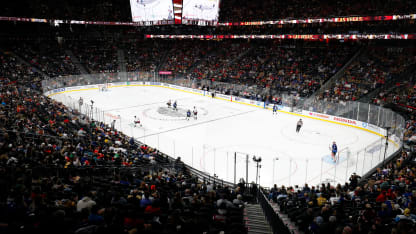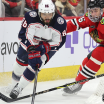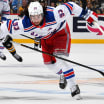NHL salary cap for 2023-24 to be discussed at Board of Governors meeting
Could increase by at least $4 million; Senators pending sale also on agenda

© Icon Sportswire/Getty Images
The BOG will also get updated on the pending sale of the Ottawa Senators and see a presentation on the working concept for a fan code of conduct that would be applied in all NHL arenas.
NHL Commissioner Gary Bettman said following the BOG meeting on Oct. 18 in New York that the salary cap for next season could rise by at least $4 million if the escrow debt the NHL players owe to the League is repaid by the end of this season. The salary cap this season is $82.5 million, $1 million more than the previous three seasons, which were impacted by the COVID-19 pandemic.
"We're only [seven] weeks after the last update we gave to the Board, obviously our finance department has gone back to the clubs, gotten revised projections and estimates, but they aren't materially different than what they were [seven] weeks ago," deputy commissioner Bill Daly said. "I think we're kind of in the same position with respect to what we're going to be telling the Board tomorrow."
The NHL exceeded $5.3 billion in revenue last season and could approach $6 billion this season.
The salary cap, which is tied to hockey-related revenue, has been considered flat since 2020-21 because the players have been paying off the escrow balance they incurred in 2019-20, when the season was paused and HRR flatlined while the players were still being paid, thus giving them more than their 50 percent share of HRR allotted to them under the terms of the NHL/NHLPA Collective Bargaining Agreement.
The NHL negotiated with the NHLPA to spread out the debt over several years, with the original projection that it would be paid off after the 2023-24 season. But revenues have continued to climb, opening the door for the players to repay their debt earlier than expected.
If the escrow debt is not repaid by the end of this season, the salary cap would rise $1 million next season and instead increase significantly for the 2024-25 season.
It's also possible the sale of the Senators could be completed at some point this season.
The BOG is expected to hear an update on the process Tuesday. Daly said he wouldn't go into details, but that there are multiple bidders who should create "a healthy process."
"There is a lot of interest in the franchise, which I think speaks highly of the League as an investment currently," Daly said.
Daly said the fan code of conduct has the support of the Player Inclusion Committee and was presented in a preliminary fashion to the BOG in October. Another presentation of the fan code of conduct will take place Tuesday.
"It's something that has been on the drawing board for the last couple of months," Daly said.
The BOG spent most of Monday hearing presentations from the League's major media partners ESPN and The Walt Disney Company, Warner Bros. Discovery (Turner), Rogers Sportsnet and Sportradar, which operates NHL.TV, the NHL's international subscription service.
There was a recap on the impact of the 2022 NHL Global Series, which featured regular-season games in Prague and Tampere, Finland, and preseason games in Bern, Switzerland and Berlin.
"We had great success in that and we're going to do it again," Daly said. "Different places, but we didn't update the board on that."
In addition, Commissioner Bettman said the NHL updated the BOG on the potential for the next World Cup of Hockey. Daly said the League is targeting Feb. 2025.
"World events have to cooperate a little more than they're cooperating now for that to happen," Daly said. "I'm not discouraged at this point. We have to plan as if we're going to have it."
The NHL was originally planning to have a World Cup in Feb. 2024, but it announced on Nov. 11 that those plans had to be pushed back, saying "the current environment is not feasible to hold the World Cup of Hockey at that time."
One of the key reasons to push plans for the next World Cup back was the uncertainty about Russian participation with the NHL continuing to suspend all business relationships with the country since its invasion of Ukraine in February.
Daly said it's possible the landscape on Russian participation in all global sporting events is changing, citing the U.S. Olympic and Paralympic Committee's announcement Monday in support of a movement started by the International Olympic Committee to allow Russians and Belarusians to compete at the 2024 Paris Olympics as neutral athletes unaffiliated with their countries of origin.
Athletes from Russia and Belarus have been banned from international sporting events since the invasion of Ukraine.
"We'll get some guidance to what's going on from the rest of the international landscape," Daly said. "If things don't shift to that extent and we have the same equation we have to make a decision if we want to go forward or not and in what form."

















